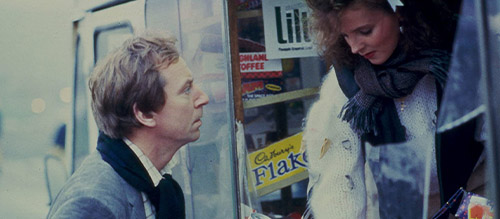Comfort and Joy (1984) Review
Comfort and Joy (1984)
Director: Bill Forsyth
Screenwriter: Bill Forsyth
Starring: Bill Paterson, Eleanor David
When taking a look at Scottish cinema, one must look no further than the works of Bill Forsyth. Although there had been numerous “Scottish” films prior to Forsyth’s debut in 1979, very few were helmed by Scottish directors and even fewer were as explicitly Scottish as the films Forsyth made, his numerable releases placing him alongside great directors like Satyajit Ray and Wong Kar-wai as a filmmaker synonymous with his nation’s image and identity. One of Forsyth’s greatest accomplishments as regards Scottish identity was Comfort and Joy, a satire of the gangster genre that added depth to Scottish Film and left an indelible mark on its nation’s cinematic history.
The 1984 release, which was the director’s last film in Scotland for 15 years (his return being via 1999 release Gregory’s Two Girls, a sequel to Gregory’s Girl), follows local radio DJ Alan “Dicky” Bird (Bill Paterson) who gets involved in the rivalry between two ice cream vendors, Mr. Bunny and Mr. McCool, amidst a breakup with his girlfriend (Eleanor David) of four years.
Bill Paterson is excellent as “Dicky” Bird, playing off the goofy events around him as straight as possible. The pinnacle of his performance comes in his moments in the DJ Booth, the actor oozing charisma and feeling completely natural as the character, so much so that Paterson (perhaps one of Scotland’s most recognisable stars) disappears into the role, very much becoming “Dicky” Bird as opposed to the star persona he is known for.
Although Paterson’s terrific acting chops lend a lot to the film, there is no doubt that Forsyth’s work behind the camera is what makes it all click. His setting of the 80s’ Ice Cream Wars in Glasgow, and his downplaying of those events, make for a hilarious take on the gangster film that turns the genre’s tropes on their head. This is a feat that is made even more impressive by the fact that the gangster genre had only just reached the shores of bonnie Scotland five years prior with 1981’s A Sense of Freedom.
Forsyth had already honed his craft as a director by the time he made Comfort and Joy, this 1984 release becoming a showcase of his matured abilities as a filmmaker. Using the phenomenon of the local celebrity in “Dicky” Bird and the (surprisingly) seedy underworld of ice cream sales to create a wonderfully bizarre world for the story to take place in, Forsyth crafted a tonally obscure but equally as immersive world, radio jingles and over-the-top music included.
While Forsyth’s direction is vital to the success of Comfort and Joy as a watchable film, it is the screenplay he wrote that makes for such a remarkable albeit turbulent experience.
The narrative itself takes the film into sillier territory the longer it goes on, and the screenplay is jam-packed with hilariously witty dialogue as well as some hysterical running gags (such as the constant destruction of “Dicky” Bird’s car). The deeper “Dicky” gets involved with the rival ice cream families, the more in control of his life he becomes, and the preconceived stereotypes popularised by films such as The Godfather make for tension whenever either of the Italian families of Mr. Bunny and Mr. McCool are on screen, despite there being almost no real consequences for “Dicky” himself.
While the film’s unique screenplay may be its greatest strength, it is also its biggest weakness, creating a handful of problems that truly weigh down the rest of the picture. The biggest problems Comfort and Joy runs into are the unsatisfactory conclusions to narrative threads, the two events that essentially kick-start the film – “Dicky’s” break up with his partner of four years, and subsequent heartbreak, as well as his slight crush on Charlotte (one of Mr. Bunny’s vendors) – merely fizzle out, and a few of the running gags never really go anywhere.
Comfort and Joy is, then, a film that comes with its issues, and that is perhaps why it’s not quite as well remembered as some of Forsyth’s previous works, but the strengths of its unique outlook and individualistic presentation heavily outweigh its narrative weaknesses, making for a film that encapsulates Scotland in all of its bizarre glory; a memorable inclusion in the well regarded Forsyth filmography.
20/24


